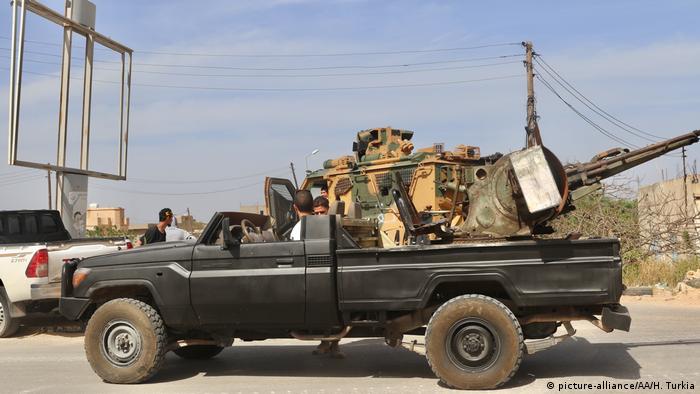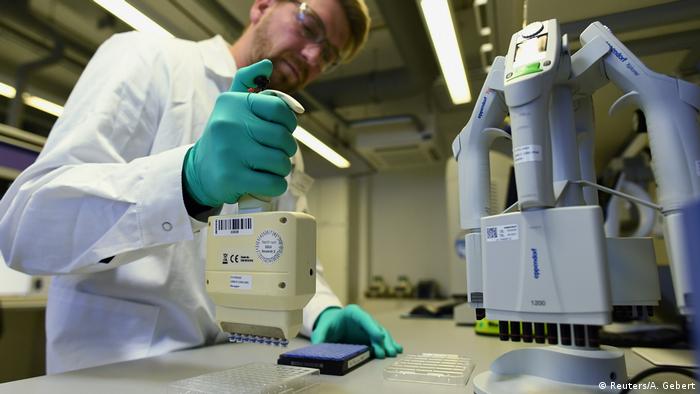Germany exports millions in arms to Libya war belligerents, despite embargo
Despite supporting an embargo, Germany has exported €330 million in weapons to countries involved in the war in Libya. The conflict has escalated since Khalifa Haftar's forces seized Tripoli.

Since hosting a Libya summit four months ago, the German government has approved arms exports worth €331 million ($358 million) to countries accused of supporting warring parties in the country, according a report from the German Economy Ministry seen by news agency DPA.
Between January 20 and May 3, Germany approved €308.2 million in arms destined for Egypt alone, the ministry said. The information was provided in response to a request from Germany’s leftist die Linke party.
The German government also approved €15.1 million in arms exports for Turkey and €7.7 million for the United Arab Emirates (UAE), DPA reported.Turkey supports the Government of National Accord (GNA), which is backed by the UN, while Russia, Egypt, and the UAE support rival forces led by Khalifa Haftar.
Read more: Khalifa Haftar's repressive proto-state and the 'myth' of stability
Embargo on ice?
Libya has been plagued by warfare since the Western-backed toppling of Libyan dictator Muammar al-Gaddafi in 2011. Multiple groups continue to fight for power in the oil-rich country, often with backing from foreign powers.
In January, Germany hosted a summit of world leaders whose countries have sent arms or soldiers to Libya.
In a closing declaration, 16 countries and international organisations agreed to a weapons embargo for Libya.
Read more: UN welcomes Libya peace commitments from Berlin summit
Deep frustration from UN
Egypt, Turkey, Russia, and the UAE were among the signatories. United Nations Secretary-General Antonio Guterres later accused these four countries of breaching the embargo and continuing to provide arms for the conflict.
"I am deeply frustrated with what’s happening in Libya," Guterres said at a press conference in February. "They committed not to interfere in the Libyan process and they committed not to send weapons or participate in any way in the fighting. The truth is that the Security Council (arms) embargo remains violated."
Conflict has escalated since April last year, when Haftar's forces seized Tripoli from the GNA.
Violence has continued in recent weeks despite international calls for a cease-fire in light of the coronavirus outbreak.
Read more: Germany threatens 'consequences' over Libya arms sales
Watch video 12:35 Hell on Earth: Refugees in Libya
Permalink https://p.dw.com/p/3cLnv
DW RECOMMENDS
EU launches new Libya arms embargo mission in Mediterranean
The EU has agreed to launch a new mission in the Mediterranean to monitor the UN-mandated arms embargo on Libya. NGOs are critical of the bloc's policy on fighting human smuggling and arms trafficking. (26.03.2020)
Berlin: Libya peace summit agrees on commitment to UN arms embargo
The summit on the conflict in Libya has ended with an agreement to more strictly enforce the UN arms embargo. Host Angela Merkel said a "new spirit" had been created to find a lasting solution to the conflict. (19.01.2020)
Germany urges Libya's neighbors to help find solutions
The German foreign minister has called for collective efforts to end the conflict, saying Libya's neighbors "also suffer from this civil war." Algerian officials have sought to position Algiers as a key mediator. (23.01.2020)
Turkey warns Libya's Haftar of military escalation
The Turkish government said it would consider forces loyal to general Khalifa Haftar "legitimate targets" if they didn't stop attacks on diplomatic missions. The UN has warned that Haftar's may have committed war crimes. (10.05.2020)
Libya: Khalifa Haftar declares 'popular mandate,' end to 2015 UN agreement
The commander of the Libyan National Army said his forces had a "popular mandate" to rule Libya. He also declared an official end to a UN-brokered political agreement that attempted to establish a unity government. (28.04.2020)
Libya: Turkish strategy leaves Haftar on the defensive
The tides have turned in Libya's conflict as Turkish intervention has tilted the balance of power. What options do Khalifa Haftar and his foreign backers now have? (07.05.2020)
Berlin Libya summit: Who wants to achieve what?
Leaders and top government officials are meeting to discuss a solution to Libya's complex civil war. As expectations build, DW looks at what each party is hoping to achieve. (19.01.2020)
AUDIOS AND VIDEOS ON THE TOPIC
Power struggle in Libya: Does peace have a chance?
Date 17.05.2020
Author Kristie Pladson
Related Subjects Libya, Germany
Keywords Germany, Libya, weapons, arms exports, arms















